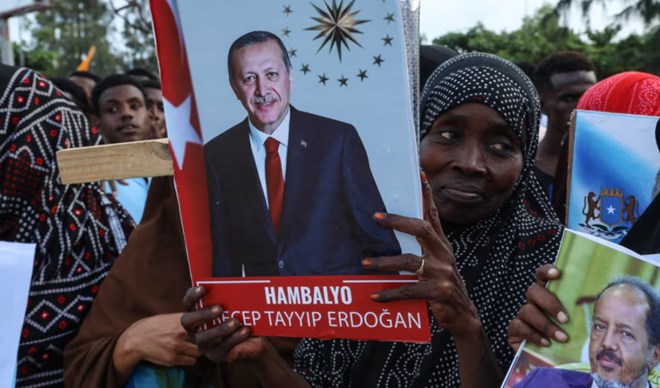
Monday July 22, 2024

Somalis celebrate the victory of Turkish President Recep Tayyip Erdogan after he won the presidential run-off election during the celebrations organized by the government in Mogadishu, May 29, 2023.
ISTANBUL — Turkey is pushing for diplomatic and economic influence on the world stage -- not least in Africa, where it announced plans this week to search for oil and gas off Somalia.
Over President Recep Tayyip Erdogan's two decades in power, Ankara has consolidated its foothold on the continent, quadrupling its number of embassies there.
Here are five of Turkey's diplomatic and economic interests and strategies in Africa:
'Alternative to the West'
At a time when many African countries are turning away from their former colonial rulers, Turkey has looked to fill the void left behind.
"Erdogan presents himself as an alternative to the West," said Selin Gucum, author of a study on Turkish interests in Africa for Paris's Observatory of Contemporary Turkey.
Gucum told AFP that Ankara often emphasizes the "sincerity" of its presence on the continent compared to that of Europeans, who bear the legacy of colonialism.
And Erdogan can be less squeamish about what partners he chooses, according to a report on Turkey's defense accords with African countries by Teresa Nogueira Pinto, an analyst at Geopolitical Intelligence Services.
"Unlike the West, Turkey does not make this assistance conditional on governance or human rights commitments," Pinto wrote.
Defense and security
Turkey has signed defense agreements with a number of states spanning the breadth of the continent, including Somalia, Libya, Kenya, Rwanda, Ethiopia, Nigeria and Ghana.
Those agreements have opened up contracts for Turkey's defense manufacturers, notably for its reputedly reliable and inexpensive drones.
Popularly used in the fight against terrorism, Turkish drones have been recently delivered to Chad, Togo, and the junta-led Sahel trio of Burkina Faso, Mali and Niger.
Fossil fuels and nuclear
Turkey is also expanding its interests in Africa's energy sector.
In September or October it plans to launch an oil and gas exploration mission off the coast of Somalia, similar to the one it is carrying out in Libyan waters.
Ankara is also said to be coveting Niger's abundant uranium deposits which it needs to operate its future Russian-built Akkuyu nuclear power station -- although Ankara's diplomats deny this.
Nonetheless, Erdogan has bolstered ties with Niger's ruling generals since their 2023 coup d'etat. Niamey received Turkey's intelligence chief and foreign, energy and defence ministers on Wednesday.
Infrastructure and construction
Ankara is generally seen as a "reliable partner", said Didier Billion, Turkey specialist at the French Institute for International and Strategic Affairs -- "particularly in the construction and infrastructure sectors."
When Turkish companies build big-ticket projects like hospitals, airports, or mosques, "deadlines and budgets are met, he added.
That reputation means more demand: in 2023, Turkish contractors were involved in $85.5 billion worth of projects, according to the trade ministry.
Turkish Airlines also crisscrosses the continent, flying to 62 destinations in Africa.
In 2012, it became the first airline to return to Mogadishu, whose airport was rebuilt with Turkish funding and assistance.
Religion, schools and television
Turkey has accumulated considerable soft power in the region, notably through education, the media and its shared religion with Africa's many Muslim countries.
The religious Turkish Maarif Foundation has expanded to a network of 140 schools and institutions catering for 17,000 pupils, while 60,000 Africans are students in Turkey.
Ankara's powerful Directorate of Religious Affairs has stepped up its humanitarian activities and support for mosques and religious education across the region.
Billing itself as the first Turkish television channel on the continent, NRT boasts on its website that it serves 49 African countries, spreading the Turkish language.
Public broadcaster TRT also has programs in French, English, Swahili and Hausa and is developing training courses for future journalists.
Turkey's religious conservatism likewise resonates with many African countries, at a time when anti-LGBTQ laws are being adopted on the continent.
"When Erdogan denounces 'LGBTQ people who undermine family values', for many Africans, that's music to their ears," Billion said.